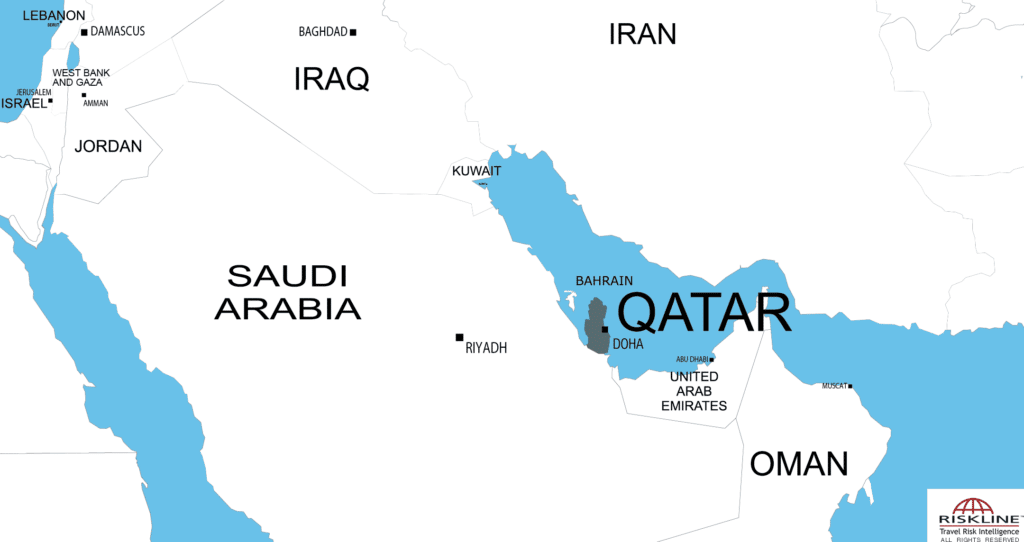On 5 June 2017, Bahrain, Saudi Arabia, the United Arab Emirates (UAE), Egypt, Yemen, the Maldives and one of the rival governments in Libya announced they were cutting all diplomatic ties with Qatar. In the following days, several other countries, including Jordan, the Comoros and Mauritania either rebuked Qatar or expelled Qatari diplomats from their countries. The announcement, foreshadowed by a barrage of anti-Qatar news coverage across Gulf Cooperation Council (GCC) states and two high profile hacks – one since blamed on Russia – falsely attributing statements supportive of Iran, Hezbollah and Hamas to senior Qatari officials, appears to be a clear attempt by Saudi Arabia and the UAE to curtail Qatar’s independent foreign policy and force it to follow the Saudi and UAE positions on geopolitical issues in the region.
Immediately after the announcement the aforementioned states made a series of moves to place pressure on Qatar: Saudi Arabia closed its land and sea borders with the country; Saudi Arabia, the UAE and Bahrain ordered that all Qataris leave those countries within two weeks of 5 June, and subsequently closed their airspace to all Qatari flights. Etihad, Emirates, FlyDubai, Air Arabia, Saudia, Gulf Air and Royal Air Maroc suspended all flights to Qatar, while Qatar Airways suspended all flights from Qatar to Saudi Arabia, Egypt, the UAE and Bahrain until further notice. These actions caused the Qatari stock market to fall sharply – with the S&P rating agency downgrading Qatar from an AA- to AA credit rating – as well as triggering panic buying across the country over concerns that the de facto blockade will impact the country’s food supply, the majority of which is imported.
Saudi Arabia subsequently issued a series of demands to Qatar, including the expulsion of all Hamas, Muslim Brotherhood and ‘anti-GCC elements’ from Qatar, the shutdown of Al-Jazeera and a pledge of support for GCC policy. These demands are similar to those made in 2014, when Saudi Arabia, the UAE and Bahrain withdrew their ambassadors from Qatar for eight months. While Qatar has already made moves to meet some of the demands – including the removal of a number of Hamas members – it remains unclear whether it will be prepared to shut down Al-Jazeera or curtail its support for Iran and Shia militias across the Middle East.
Although the short-term economic impact of the diplomatic crisis is likely to be minor, due to the relative lack of inter-GCC trading, if the crisis continues then the long-term impact may be significant, with foreign investors likely to treat the GCC as a whole as unstable, reducing investment and spending across the area. There is also the potential for Saudi Arabia and the UAE to pressure foreign firms operating in Qatar, by limiting or suppressing their operations in those countries. More importantly, the attempts to close off Qatari airspace and allegations that the UAE has threatened foreign airlines that operate flights through Qatar, may cause international airlines to reassess their use of airports in the region as major flight hubs.
The crisis has also opened the door to countries looking to undermine the United States’ (US) influence in the region, particularly after US President Donald Trump openly supported the suppression of Qatar, aligning the US with Saudi Arabia and the UAE; the success or failure of the move is likely to be seen as the success or failure of US policy in the region. Turkey has redoubled its support for the county, offering to symbolically deploy troops to Qatar in a show of solidarity. Both Iran and Russia have quickly moved to support Qatar both politically and materially, with Iran offering to immediately supply food and other goods and Russia loudly calling for the involved parties to resolve the issue diplomatically. With Qatar hosting the largest US base in the region, al-Udeid Air Base, the improvement in Qatar-Russia and Qatar-Iran relations, and any decline in US-Qatar relations, may adversely impact US military operations in the region. This will be particularly true if the crisis continues for an extended period, and if the US makes further statements in support of Saudi Arabia and the UAE.
However, it remains unclear whether the diplomatic crisis will continue in the long-term. Saudi Arabia and other states have alluded to further sanctions if Qatar does not meet their demands; emboldened by US support, they may choose to press the issue. Nonetheless, the most significant impact on travellers is the disruption to international flights through the region. If the crisis is prolonged, a number of long-haul routes – particularly those between European and African states – may move away from Qatari airports or be required to take extended detours. Shortages of food and other goods are unlikely to have a major impact in the short-term, but may be disruptive in the long-term. The realignment of regional and international powers, either in support of or in opposition to Qatar, is unlikely to directly affect foreign travellers in the short-term.















